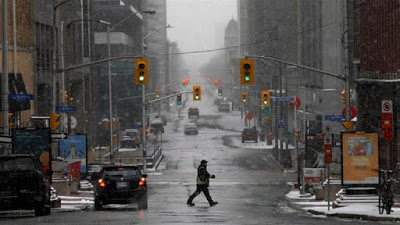For the West, war comes home
 |
| Andrew Mitrovica 21 April 2020 |
It is our turn now to experience the trauma of war.
For me, it happens in the morning twilight when night gives way to dawn.
That is when my comfortable cocoon abruptly yields to the same jarring, stubborn truth: an invisible killer has gripped the world and it will not let go.
Awake and lying in the stillness for a moment, I wonder how many more people have become infected and succumbed overnight, casualties of this new and insidious virus? Every morning, the answer is inevitably the same – too many more.
Then I remember that my family and I are fortunate. We are safe, or as safe as you can be amid a capricious pandemic. We have a home that has become a fortress, save a moat. My wife and I are able to work from home. We have not – for the time being, at least – lost our jobs. We have been able to arrange for the necessities of life to be delivered to our front door.
We know that so many poorer people, in so many volatile places in Canada and abroad cannot do the same. Still, we and they are bound, we are told, by dread and anxiety – the psychological residue of a “war” we are waging “together” against a silent “enemy” that kills with lethal and indiscriminate efficiency.
It is a smug, exculpatory evasion.
Like many of us who live in the West, my family and I have watched, usually with blithe indifference, as countless people in countless places are maimed – in body, mind and spirit – and killed in real wars fought with real weapons year after grim year.
The victims of these wars, blockades and embargoes – engineered often by Western powers or their proxies with ruthless facility – are, of course, being killed and maimed far away and out of sight. They do not count, unless they become a figure on a ledger.
We do not remember them. We do not express solidarity with them. We do not pause to pay homage to them. We do not call them heroes. And we will not rescue them even as their near-perpetual panic and anguish are being compounded by a deadly, rampaging virus.
Instead, we forget them. On the rare occasions we think about them, we blame them for their suffering and deaths. Worse, we say they do not value life, including the lives of their children. We say their faith turns most of them into terrorists, including, again, their children, who welcome death. So, we revel in the punitive sights and sounds of round after round of “shock and awe” as their rightful comeuppance.
We never have and never will accept any blame or responsibility for the suffering and deaths the West is largely to blame and responsible for. They are always guilty and we are always innocent. We deserve to live. They deserve to die.
For generations, the children, women and men we have forgotten and dismissed have understood that death can arrive abruptly. They know how impossible it can be to bury and grieve for loved ones who have perished in war. They know the daily, grinding byproducts of war are fear, uncertainty and sorrow. They know the trauma of war damages in unseen ways, often beyond repair. They know the other constant, sad dividends of war – desperate want and rampant hopelessness.
But as long as the lives of anonymous people in distant lands are being cut violently short or frozen in an incessant state of doubt and despair, we in the West do not mind.
Now, the proverbial tables have indeed turned.
These days, we are facing the profound and lasting human consequences of a different kind of “war” – courtesy of a virus, not bullets or bombs.
Beyond the occasional spasms of appalling violence orchestrated by fanatics, we were convinced that we were immune to the shocking and wrenching vagaries of war of any sort, at any time.
We were wrong.
War has invaded our homes, too. The reassuring routines that help define our once agreeable way of life have suddenly come undone.
It is our turn to know and experience the uncertainty, the worry, the hardship, the loss, the grief, the pain, the want, the trauma and the sometimes paralysing fear that so many others, in so many places have known and experienced for too long.
The sacrifices we are being asked to make in a bid to trounce this pandemic are trivial by comparison. We have been told to stay at home, wash our hands and keep our distance to protect ourselves and others.
But the selfish few resist, conditioned as they are by a culture of consumption to do whatever they want, whenever they want and damn the potentially dire repercussions.
Eventually, this pandemic will end. We do not know when and how it will end. Nor do we know what we will return to, given that our lives may be changed in ways that we will not be able to fathom or repair until the pandemic is over.
You may recall that the microscopic optimist in me hopes that we have understood the need to reimagine our role as citizens in a reimagined society where the public good trumps private profit.
The cynic in me knows that is unlikely to happen. We will promptly go back not only to satisfying our insatiable need for ephemeral trinkets, but to our complacent and mercenary ways.
Meanwhile, I am certain we will blissfully continue to pay little, if any, heed to the grave plight of innocents being slaughtered and disfigured in real, endless wars today and tomorrow.
That will never change.
The views expressed in this article are the author’s own and do not necessarily reflect Al Jazeera’s editorial stance.


